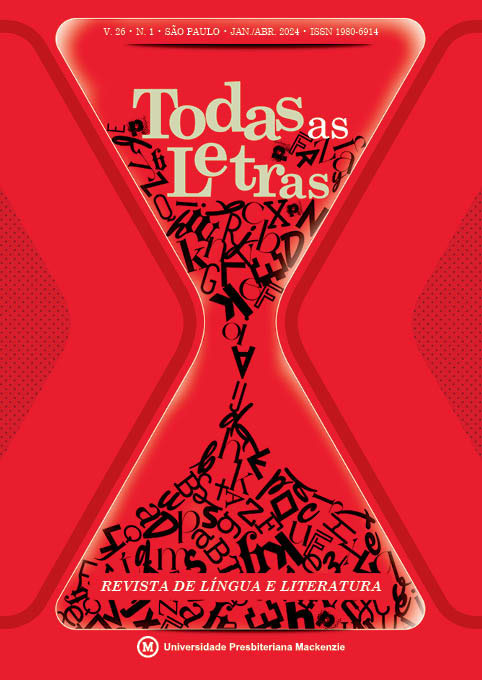Homoerotic and Fiscal Fantasies in Antonio’s Inwardness: Fear and Desire of Castration
Keywords:
Interioridade, Relações homoeróticas, Subjetividade, Shakespeare, O mercador de Veneza.Abstract
Esta pesquisa discute a estranha relação entre Antonio e Bassanio, assim
como a relação do mercador com Shylock. Sua relação é representada como
homoerótica e o desejo de um sacrifício inexplicável de Antonio por Bassanio
sugere aspectos da interioridade de Antonio. Shylock também é representado
como o pai primordial da peça, e esse detalhe sugere a causa da tristeza de
Antonio no começo da peça. O conceito de interioridade é pensado por Maus
(1995) como um construto social e cultural da Renascença Inglesa. Ela analisa
a interioridade tomando como base a oposição entre aparências, considerando
falsas e enganosas na época, e interioridade, que era tida como manifestações
sinceras e verdadeiras das dimensões interiores do indivíduo.
Downloads
References
ADELMAN, J. Blood relations: Christian and Jew in The merchant of Venice. Chicago; London: The University of Chicago Press, 2008.
COLLEGE DICTIONARY. London: Oxford, 1978.
COYLE, M. The merchant of Venice: contemporary critical essays. London: Macmillan: 1998. (New Casebooks).
DRAKAKIS, J. Historical difference and Venetian Patriarchy. In: COYLE, M. The merchant of Venice: contemporary critical essays. London: Macmillan, 2010. p. 181-208.
GERVENUS, G. G. The merchant of Venice. In: WILDERS, J. (org.). Shakespeare: The merchant of Venice. London: Macmillan, 1969.
HINELY, J. L. Bond priorities in The merchant of Venice. Studies in English Literature, 1500–1900, v. 20, n. 2, p. 217-239, Spring, 1980. Rice University. DOI: https://doi.org/10.2307/450170.
HOLLAND, N. Psychoanalysis and Shakespeare. New York; London: McGraw- Hill, 1966.
HONAN, P. Shakespeare: uma vida. 2. ed. Tradução Sonia Moreira. São Paulo: Companhia das Letras, 2001.
KAPLAN, M. L. (ed.). The merchant of Venice: texts and contexts. New York: Palgrave, 2002. MAUS, K. E. Inwardness and theater in the English Renaissance. Chicago; London: University of Chicago Press, 1995.
MCGINN, C. Shakespeare’s philosophy: discovering the meaning behind the plays. New York: Harper, 2007.
NEWMAN, K. Shakespeare’s rhetoric of comic character: dramatic convention in classical and renaissance comedy. London: Routledge, 1985.
O’ROURKE, J. Racism and homophobia in The merchant of Venice. ELH, v. 70, n. 2, p. 375-397, Summer 2003. Retrieved from http://www.jstor.org/stable/ 30029881. Accessed: Jan. 20, 2021.
PATTERSON, S. The bankruptcy of homoerotic Amity in Shakespeare’s Merchant of Venice. Shakespeare Quarterly, v. 50, n. 1, p. 9-32, Spring, 1999. Shakespeare Library in association with George Washington University. Retrieved from http://www.jstor.org/stable/2902109. Accessed: Jan., 20 2021.
SCHOENFELDT, M. C. Bodies and selves in early modern England: Physiology and inwardness in Spencer, Shakespeare, Herbert, and Milton. New York; Cambridge: Cambridge University Press, 1999.
SHAKESPEARE, W. The merchant of Venice. Edited by Barbara Mowt & Paul Werstine. New York: Washing Square Press, 1992.
SHAKESPEARE, W. Complete works. London: Wordsworth Editions, 2007.
SHAKESPEARE, W. The merchant of Venice. Edited by John Drakakis. London: Arden, 2010.
SHERLEY, J. The merchant of Venice. KAPLAN, M. L. (ed.). The merchant of Venice: texts and contexts. New York: Palgrave, 2002.
SINFIELD, A. How to read The merchant of Venice without being heterosexist. In: COYLE, M. The merchant of Venice: contemporary critical essays. London: Macmillan, 1998.
WEBER, M. A ética protestante e o “espírito” do capitalismo. Tradução José Marcos Mariani de Macedo. São Paulo: Companhia das Letras, 2004.
Downloads
Published
How to Cite
Issue
Section
License
Copyright (c) 2024 Carlos Roberto Ludwig

This work is licensed under a Creative Commons Attribution-NonCommercial 4.0 International License.
The originals accepted and published become property of Mackenzie Presbyterian University, being forbidden their total or partial reproduction without permission of the Editorial Board, except for study and research.




